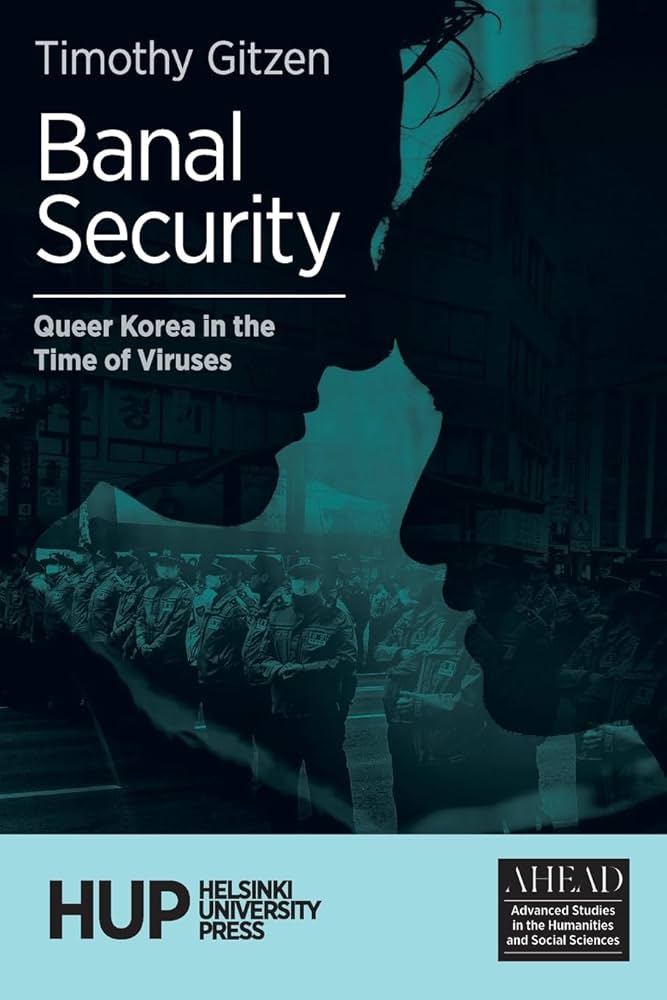Behind the Book: Q&A with Dr. Timothy Gitzen
By Erin Marlow, Communications Specialist in the Office of the Dean of the College
Assistant Professor of Anthropology Dr. Timothy Gitzen recently published his new book, Banal Security: Queer Korea in the Time of Viruses. The book examines how national security concerns in South Korea, heightened by decades of Cold War tensions, have been used to justify discrimination of non-normativity. Combining ethnography with his 15 years of experience living in South Korea, Dr. Gitzen discusses the discriminatory rhetoric and highlights the work of queer activists in Korea who aim to eliminate oppression and refocus the conversation of discrimination to one of resilience.
Dr. Gitzen recently spoke with the Dean’s Office about the origins of the book and his plans for upcoming research.
What inspired you to write this book?
After a decade of experience living and working in South Korea, I began to think critically about how queer folks were treated in Korean politics and society. I noticed that the rhetoric I was accustomed to in the United States took on a more heightened quality in Korea, such that national security was mobilized to interpret and understand non-normativity, namely queer folks. This is where the inspiration for my book emerges, in the trenches of discrimination and the queer activism charged itself with eliminating oppression and ushering in a more equitable life for queer folks. The work that queer activists in Korea do to reframe the conversation of discrimination away from security and toward survivability and resilience, charting a course for individuals to live lives amidst the security-laden context of being queer in South Korea, lies at the heart of this book and my own research and teaching philosophy and practice.
What was a major challenge that you faced in your research?
Ethnography is a difficult research method, and it is messy. Whether anthropologists will outwardly admit it or not, we often make mistakes and experience failure in the field and in our writing. I am certainly no different and have my share of mistakes and failures that inform my book and my future research methodologies. Ethnography, if done right, humbles an anthropologist and requires the anthropologist to actively manage their positionality amongst their interlocutors and research.
The research for this book, as with most ethnography, took time, energy, and continued passion for the topic to see to fruition — ethnography is most definitely not for the faint of heart. Imagine spending 18 months living in one’s research setting, doing nothing but research — it shapes one’s life, yes, but also one’s thinking. I began to see the world through an activist lens, meaning I could see the ways social change is necessary for social justice.
The writing, however, was perhaps even more precarious. Faced with my mistakes and failures, I found it difficult to overcome that inevitable imposter syndrome to craft a book that I believed spoke to both the immediate context of South Korea and to a more anthropological tradition of contesting power, discrimination, and social justice. And yet, the book became the ultimate culmination of not only my thinking, but my more than 15 years of experience in South Korea.
What would you say is your project’s unique contribution to the field?
Just the other day I was teaching students in my “Introduction to Cultural Anthropology” (ANT 114) class about sexuality and Post-Soviet Cuba. In our discussion of the book After Love by Noelle Stout, I asked students what it might mean to frame sexuality as a threat to both the family and even the nation. This question also lies at the heart of my book. Queer activism became a methodology for studying the more structural issue I saw at the heart of discrimination in South Korea: national security. The anthropology of security is a growing field — as is an interdisciplinary approach to security — and so, informed by past research, I critically approached national security in South Korea as itself an object of study.
In my book, I theorize how the more than 50-year history of North and South Korea and the continued cold war tensions that still inform much of South Korea’s national security has come to structure Korean society. I call this banal security, the notion that security has become so mundane given the long durée of security organizing and practices in South Korea that it becomes nearly unconscious. It is within this banality where discrimination lies, for the mobilization of national security to justify discrimination against queer folks, for instance, not only carries the weight of national security, but it is naturalized and made ordinary through that long Cold War history.
Therefore, my book draws attention, more broadly, to the ways security can be mobilized anywhere to engender and justify discrimination. We saw this after 9/11 with Muslim bodies and continue to see this with immigration. My book therefore informs these discussions with a different context but also with the attention to banality and the making ordinary of security logics and practices.
How do you bring your research into the classroom?
I am using my book in my Fall 2024 class “Anthropology of Gender and Sexuality” (ANT 329). I’ve also used parts of my research in other classes. Students are usually excited to learn more about their professor’s research. I have also hired research assistants to help collect digital data for my upcoming book based in the United States.
What’s next? Can you say a bit more about your upcoming book and how it developed from your most recent publication?
I decided to move on from South Korea once my book was published, though I do have an article or two currently under review from Korea-related research. However, most exciting is my forthcoming book with SUNY Press entitled Unscripting the Present: The Security Panic of Queer Youth Sexuality. This book traces the contemporary emergence of sex panics in the United States and demonstrates how they have been infused with security logics and rhetoric to create what I call security panics. I focus specifically on security panics involving queer youth and queer youth sexuality, such as Florida’s terrible “Don’t Say Gay” law and the swarm of equally disgusting laws that followed in other states. Yet I am ultimately a hopeful scholar and person, and so my book shifts to talk about representations of queer youth sexuality in popular culture and how queer youth find ways to carve out spaces of survivability and resilience for themselves and others. Eschewing a forward-looking framing of things getting better — a framing that, interestingly enough, mirrors the forward-looking bent of security — queer youth seem to focus on the present as method for unscripting the social and security scripts of queer youth sexuality and youth sexuality more broadly. The book is scheduled for an April 2025 publication.
Banal Security:
Queer Korea
in the
Time of Viruses


Imagine spending 18 months living in one’s research setting, doing nothing but research — it shapes one’s life, yes, but also one’s thinking. I began to see the world through an activist lens, meaning I could see the ways social change is necessary for social justice.
Dr. Gitzen

